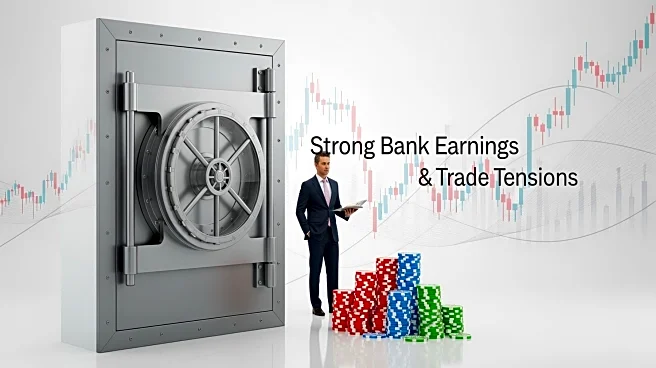What's Happening?
U.S. stock futures remained relatively unchanged as strong earnings from major banks shifted investor focus from domestic and international risks. The Dow Jones Industrial Average futures rose by 75 points, while S&P and Nasdaq 100 futures saw modest
increases. The stock market experienced choppy trading, with the S&P 500 and Nasdaq closing in the green, driven by positive bank earnings. However, trade tensions between the U.S. and China, exacerbated by President Trump's threats of tariffs, have increased market volatility. The ongoing U.S. government shutdown has further complicated the economic landscape, delaying crucial data releases.
Why It's Important?
The stability in stock futures amidst strong bank earnings highlights the resilience of the financial sector, even as trade tensions and government shutdowns pose challenges. Investors are closely monitoring corporate earnings for insights into the U.S. economy's health, especially given the lack of economic data due to the shutdown. The concentration of returns in technology stocks, driven by the artificial intelligence trade, underscores the market's reliance on a few dominant companies. This situation presents both opportunities and risks, as investors navigate a complex environment marked by geopolitical tensions and domestic policy uncertainties.
What's Next?
As the earnings season progresses, investors will continue to assess corporate performance and its implications for the broader market. The U.S. government's handling of trade tensions and the shutdown will be critical in shaping economic conditions. The Federal Reserve's interest rate decisions, influenced by inflation and labor market concerns, will also play a significant role in determining market dynamics. Stakeholders may need to adjust strategies to mitigate risks associated with concentrated stock returns and geopolitical uncertainties.
Beyond the Headlines
The ongoing trade tensions and government shutdown highlight deeper issues in U.S. economic policy and international relations. The reliance on technology stocks for market gains raises questions about diversification and the sustainability of current trends. As investors seek stability, the role of government actions and corporate strategies in shaping economic outcomes becomes increasingly significant. The situation underscores the need for comprehensive policy approaches to address trade, fiscal, and monetary challenges.
















